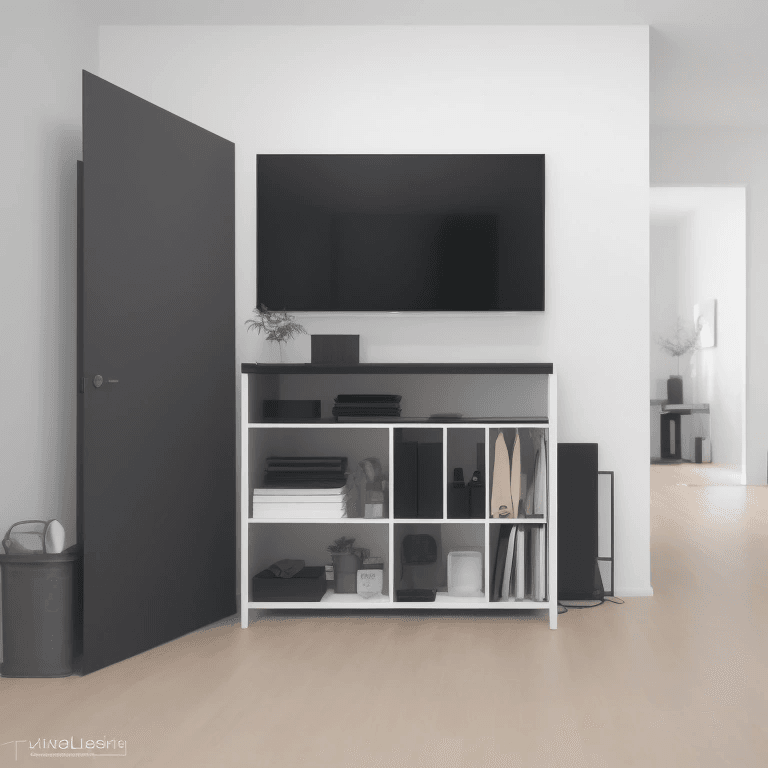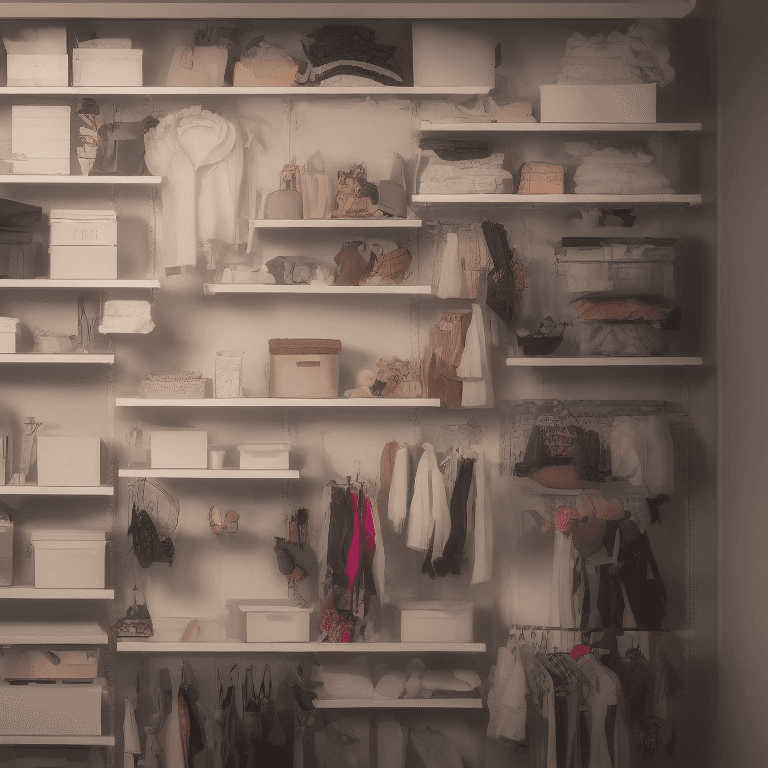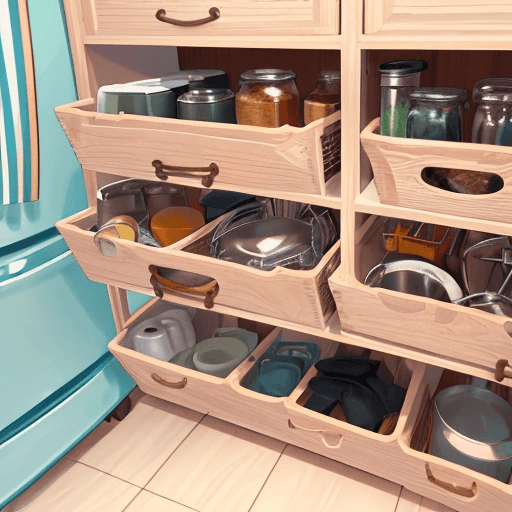The Rise of Minimalist Living
In an era defined by excess, a counter-movement is gaining momentum: minimalist living. It’s not merely about owning less; it’s about curating a life filled with purpose, intention, and serenity. At the heart of this philosophy lies organization – not just any organization, but premium, thoughtfully designed solutions that enhance both aesthetics and functionality. Forget cluttered closets and overflowing drawers; the minimalist home of 2025 is a sanctuary of calm, where every item has its place and contributes to overall well-being.
As we delve into the world of minimalist living, we’ll explore how premium organization solutions are transforming homes into havens of tranquility, fostering a sense of balance and control in our increasingly chaotic lives. This shift towards minimalist living is fueled by a growing awareness of the detrimental effects of consumerism on our mental health and the environment. The constant influx of new possessions can lead to feelings of overwhelm, anxiety, and a sense of never quite having enough.
Premium organization, therefore, becomes a crucial tool for reclaiming our spaces and our minds. By strategically decluttering and implementing smart storage solutions, we create environments that promote focus, creativity, and relaxation. Imagine a kitchen where every utensil has its designated spot, or a home office free from distracting clutter—these are the hallmarks of a minimalist-inspired space designed for mental clarity. Moreover, the principles of minimalist living are increasingly intertwined with the pursuit of sustainable living.
Consumers are now actively seeking eco-friendly alternatives to traditional storage and organization products. This demand has spurred innovation in the home organization sector, with companies now offering a wide range of sustainable storage solutions crafted from materials like bamboo, recycled plastics, and organic cotton. For example, modular shelving systems made from sustainably harvested wood offer a flexible and eco-conscious way to organize living spaces, while reducing reliance on fast-furniture options. Embracing these sustainable choices not only reduces our environmental footprint but also aligns with the core values of minimalist living: intentionality, simplicity, and respect for the planet.
Looking ahead to 2025, the integration of smart home technology will further revolutionize minimalist organization. Imagine a smart closet system that automatically tracks your wardrobe, suggests outfits based on weather and occasion, and even alerts you when items need cleaning or repair. These advanced systems will not only streamline daily routines but also help to minimize unnecessary purchases by providing a clear overview of existing possessions. Furthermore, AI-powered inventory management systems will optimize storage space throughout the home, ensuring that every item is easily accessible and efficiently stored. This seamless integration of technology and minimalist principles will usher in a new era of effortless organization and intentional living.
The Psychology of Decluttering
Minimalism isn’t just a trend; it’s a conscious choice to prioritize experiences and relationships over material possessions. Studies have shown that decluttering and organizing can significantly reduce stress and anxiety levels. A study published in the *Journal of Environmental Psychology* found that cluttered home environments were associated with higher levels of cortisol, the stress hormone. Premium organization solutions support this lifestyle by providing designated spaces for essential items, making it easier to maintain a clutter-free environment.
Examples include modular storage systems that adapt to changing needs, custom-designed closets that maximize space utilization, and smart home technologies that automate organization tasks. These solutions empower individuals to create a home that reflects their values and supports their mental and emotional well-being. The link between our physical spaces and mental well-being is increasingly recognized by psychologists and design experts alike. A decluttered home acts as a sanctuary, fostering a sense of calm and control.
Premium organization solutions contribute to this by providing intuitive systems that simplify daily routines. Imagine a smart pantry that automatically reorders groceries as you use them, or a closet system that suggests outfits based on the weather and your schedule. These aren’t just luxuries; they are investments in mental clarity, freeing up cognitive bandwidth for more meaningful pursuits. The KonMari method, popularized by Marie Kondo, emphasizes the importance of keeping only items that “spark joy,” further highlighting the emotional connection we have with our belongings.
Smart home organization solutions in 2025 are poised to take this concept even further, integrating seamlessly into our lives to anticipate our needs and minimize mental clutter. AI-powered systems will learn our habits and preferences, proactively suggesting decluttering routines and optimizing storage spaces. Imagine receiving a notification suggesting you donate clothes you haven’t worn in six months, or a smart storage unit that automatically rotates items based on seasonality. These technologies, combined with minimalist principles, offer a powerful pathway to a more organized and less stressful life.
This proactive approach to home organization reduces the cognitive load associated with decision-making, contributing to a greater sense of mental well-being. Furthermore, the rise of sustainable living has amplified the psychological benefits of decluttering. By consciously choosing eco-friendly storage solutions and reducing consumption, individuals experience a sense of purpose and alignment with their values. Premium organization solutions crafted from sustainable materials, such as bamboo or recycled plastics, not only minimize environmental impact but also contribute to a feeling of ethical responsibility. This sense of contributing to a larger cause can further enhance mental clarity and reduce anxiety, creating a positive feedback loop between our environment, our possessions, and our psychological state. Embracing both minimalist living and sustainable practices allows for a holistic approach to well-being, fostering a sense of harmony and balance.
Sustainability and Minimalist Organization
The minimalist movement is no longer a fringe trend but a powerful cultural force, increasingly intertwined with the urgent need for sustainability. Premium organization solutions are at the forefront of this convergence, moving beyond mere aesthetics to embrace eco-friendly materials and ethical practices. Consumers are actively seeking storage solutions crafted from sustainable sources like rapidly renewable bamboo, reclaimed and recycled wood certified by the Forest Stewardship Council (FSC), and organic cotton for textile-based organizers. These materials not only reduce environmental impact but also contribute to a healthier indoor environment, free from the volatile organic compounds (VOCs) often found in conventional plastics and synthetic materials.
Companies committed to sustainable living are also minimizing their carbon footprint by adopting ethical manufacturing processes, reducing packaging waste through innovative designs like biodegradable packing peanuts and concentrated refills, and investing in carbon offset programs. The demand for transparency is also rising, with consumers expecting detailed information about a product’s lifecycle, from sourcing to disposal. Minimalist living inherently promotes a ‘less is more’ philosophy, directly impacting consumption patterns and reducing the overall environmental footprint. By consciously choosing to own fewer items, individuals naturally require less storage space, further driving the demand for thoughtfully designed, multi-functional pieces.
For example, a modular shelving system crafted from sustainably harvested timber can serve as a bookcase, display unit, and even a room divider, adapting to changing needs over time and minimizing the need for additional furniture purchases. Similarly, investing in high-quality, durable storage containers made from recycled materials reduces the reliance on disposable plastic bins that contribute to landfill waste. The principles of decluttering, central to minimalist living, also encourage mindful consumption, prompting individuals to carefully consider each purchase and avoid impulse buys that often end up as clutter.
This conscious approach to consumption is a key element in creating a more sustainable and responsible lifestyle. Looking ahead to Smart Home Organization Solutions 2025, the integration of technology will further enhance the sustainability of minimalist living. Smart storage systems will optimize space utilization, minimizing the need for excess storage capacity. Imagine a smart closet that uses sensors to track clothing inventory, identify items that are rarely worn, and suggest donation or recycling options. These systems can also provide insights into purchasing habits, helping individuals make more informed and sustainable choices.
Furthermore, the rise of the circular economy will drive the development of organization solutions designed for disassembly and reuse. Modular components can be easily reconfigured or repurposed, extending their lifespan and reducing waste. Companies will also offer take-back programs, allowing customers to return used products for recycling or refurbishment, further closing the loop and promoting a more sustainable approach to home organization. This forward-thinking approach aligns perfectly with the goals of modern sustainable living and offers a pathway to decluttering not just our homes, but also our environmental impact, fostering mental clarity through responsible consumption.
The Role of Smart Home Technology
Technology plays a crucial role in modern minimalist living, acting as a silent partner in the quest for a clutter-free and intentional existence. Smart home organization systems are emerging as powerful tools for managing belongings and streamlining daily routines, moving beyond simple storage to offer intelligent solutions. These systems leverage a network of sensors, AI-driven algorithms, and user-friendly mobile apps to track inventory with precision, optimize storage space dynamically, and even automate traditionally tedious tasks like laundry and cleaning.
For example, smart closets are no longer a futuristic fantasy; they can now analyze clothing inventory, suggest outfits based on weather conditions and upcoming events gleaned from your calendar, and even identify items that haven’t been worn in months, prompting donation or resale. Smart pantries, similarly, track food expiration dates, generate automated shopping lists based on consumption patterns, and minimize food waste – a significant boon for both the environment and the wallet. One of the most compelling aspects of these smart home organization solutions is their ability to promote mindful consumption, a cornerstone of minimalist living.
By providing clear insights into what we own and how frequently we use it, these systems encourage us to be more deliberate in our purchasing decisions. Imagine receiving a notification that you already own three similar black sweaters before adding another to your online shopping cart. This type of real-time feedback can be incredibly effective in curbing impulse buys and fostering a more conscious approach to acquiring new possessions. Furthermore, the data collected by these systems can be used to identify areas where we tend to accumulate excess, allowing us to proactively declutter and re-evaluate our needs.
Looking ahead to 2025, we can anticipate even greater integration of smart technology into premium organization solutions. Imagine AI-powered systems that not only track inventory but also learn your personal style preferences and proactively suggest ways to optimize your living space based on minimalist design principles. We might see furniture that transforms and adapts to different needs, maximizing space utilization in small apartments. Or consider smart storage units that automatically adjust temperature and humidity levels to preserve delicate items like clothing or artwork. These innovations promise to further streamline our lives, reduce waste, and promote mental clarity by creating living environments that are both functional and aesthetically pleasing, perfectly embodying the principles of minimalist living and sustainable home organization.
The Future of Minimalist Living
Minimalist living, augmented by premium organization solutions, signifies a profound paradigm shift toward intentionality and enriched living. By embracing decluttering and simplifying our possessions, we cultivate environments that foster tranquility, mental clarity, and creative expression. Sustainable materials and smart technologies further amplify this lifestyle, promoting eco-conscious and efficient living. As we approach 2025, the minimalist movement is projected to maintain its upward trajectory, encouraging individuals to prioritize experiences over material wealth and to curate homes that authentically reflect their values and aspirations.
The crux lies in investing in quality, functionality, and sustainability, ensuring that each item within our home serves a distinct purpose and contributes to our overall well-being. The integration of smart home organization solutions is poised to revolutionize minimalist living in the coming years. Imagine a smart closet that uses AI to track clothing usage, suggesting items for donation based on wear frequency and automatically generating optimal storage configurations. Or consider a kitchen pantry equipped with sensors that monitor food expiration dates, minimizing waste and streamlining grocery shopping.
These technologies not only optimize space but also contribute to a more sustainable lifestyle by reducing consumption and waste. According to a recent report by Statista, the smart home market is expected to reach $53 billion by 2025, with a significant portion of that growth driven by organization and storage solutions. Furthermore, the emphasis on sustainable living is driving innovation in eco-friendly storage solutions. Companies are increasingly utilizing recycled plastics, bamboo, and organic cotton to create stylish and functional organizers.
For example, modular shelving systems made from reclaimed wood offer a customizable and environmentally responsible storage option. Consumers are also seeking out products with minimal packaging and a low carbon footprint, reflecting a growing awareness of the environmental impact of their purchasing decisions. This trend aligns perfectly with the minimalist ethos of reducing waste and living in harmony with the environment. Embracing these modern sustainable living solutions not only benefits the planet but also enhances the sense of well-being associated with a clutter-free and eco-conscious home.
Ultimately, the future of minimalist living hinges on a holistic approach that combines thoughtful decluttering tips with premium organization and a commitment to sustainability. It’s about creating a sanctuary that supports our mental and emotional well-being, while also minimizing our impact on the planet. By embracing smart home technology and eco-friendly materials, we can create spaces that are not only beautiful and functional but also aligned with our values. As we move forward, the minimalist movement will continue to evolve, inspiring us to live more intentionally and create homes that truly reflect our best selves.


